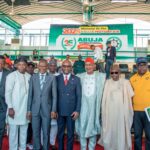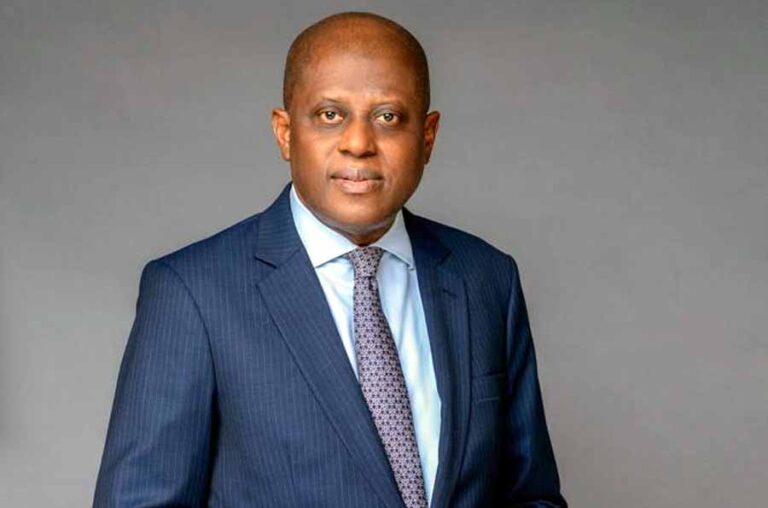Governor, Central Bank of Nigeria, CBN, Mr. Olawale Cardoso said the apex bank will continue to implement bold reforms that makes the economy works for everyone.
He spoke at the 2024 Annual Vanguard Economic Discourse with the theme: “Reform in an era of Global Economic Uncertainty: Whither Nigeria”, in Lagos.
According to Cardoso, the recent measures introduced by the CBN to reform are already bearing fruit.
He said: “The theme, Reforms in the Era of Global Economic Uncertainties: Whither Nigeria, embodies for me the tough challenges and the trade-offs that policymakers worldwide are having to make or are having to navigate in response to the terrible headwinds and economic turbulence we all face.
In this era that has been aptly captured as a vocal era, which is the era of volatility, uncertainty, is characterized by choppiness of the headwinds that are dreaming by the unending stream of shocks in the global and the regional sphere.
Global Uncertainty
This has led to what we tag today as an elevated level of global uncertainty. It is true.
There is an index called the World Uncertainty Index that measures how uncertain the world is today. And the last report of that index says that, and I like the way it summarizes it, so let me read it for you. It says, the shocks that have shaken the global economy in recent years have introduced a new normal for turbulence.
These episodes, the turbulence driven in some cases by political fragmentation between countries, these episodes also lifted uncertainty to exceptionally high levels, which in turn caused economic growth. And I think that’s the part that we are particularly interested in today. The uncertainties that we are seeing globally are having a significant impact on the economic growth and economic outcomes.
On its part, the IMF said recently that we are expecting a growth rate of about 3.2% globally. However, it was true to mention that there are clear risks to the achievement of this economic growth level, and it names those risks as including tight financial conditions, disruptions to global supply chains, geopolitical tension and economic fragmentations.
The economic market, or the financial market tightening that we have seen globally has been as a result of monetary authorities taking steps to rein in inflation. And as the market is tighten, that has had impact on developing the economy like ours because we have seen flights of investment leaving developing economy back to safety as they worry about risk and uncertainties.
Energy and financial markets as well as world trade foods have also been impacted significantly by conflicts especially the crisis in the Middle East and the conflict between Russia and Ukraine which we have seen impacting on trade and other markets. This impact has resulted in a drag on economic growth and has caused significant inflationary pressure.
In addition, we have also seen fragmentation that started during the COVID 19 where governments have resulted more in protectionism to keep more of what they produce to protect themselves.
These kinds of protectionism have created uncertainties in global trade.
Furthermore, the growth in global debt levels especially amongst developing countries that are also struggling to pay or to cover the debt repayment schedule has also created some additional uncertainty in the economic environment.
Domestic challenges
On the domestic front, we have been faced with uncertainty driven by high inflationary pressure, fx for volatility, rising debt burden and slowing economic growth.
The challenge of high inflation in Nigeria is driven largely by food inflation due to the rising cost of transport of farm produce, infrastructure related constraints, and security challenges of food producing areas and exchange rate pass through to domestic prices from imported goods.
All of these have created uncertainty for businesses and for homes.
Another concern that we face is the volatility in the foreign exchange market which over the years have been driven by market distortions and reduced supply of foreign exchange which have created opportunity for speculative activities that have impacted the price and the rate and the value of the naira.
In addition we’ve had concerns or more or less we’ve prioritized as one of the things that we need to do increasing the capacity of the banking system to be able to facilitate the size of transactions that will help us build and establish the one trillion dollar economy that Mr President has envisioned.
Distinguished ladies and gentlemen having identified some of the challenges versus the abundant human resources which is typified by the great talents and intellectual capacity that I see across the room this morning and the natural resources in our land we certainly deserve better outcomes than the current economic realities that we find ourselves in.
In responding to these uncertainties and indeed to any kind of uncertainties, the need for appropriate focus and unwavering reforms cannot be over emphasized.
As the Governor of the Central Bank of Nigeria, I remain committed to reposition the bank to deliver meaningful data-driven and sustainable solutions with clear positive impact on the livelihood of all Nigerians.
However, addressing these challenges requires the concerted effort of all stakeholders, especially the monetary and fiscal authorities working in harmony.
I therefore wish to acknowledge the contribution of Vanguard Newspaper in organizing these very important summits as a platform for collaboration and synergy in the march towards our common goal of a larger and more resilient economy.
When I was being ushered in, I had the opportunity to greet the publisher and his adorable wife and I was want to whisper to them a big thank you for putting this together because we hope that at the end of this summit, we’ll be able to harvest many new and germane ideas that we would mix with available data to move our country forward.
Like you all know, we are always on the lookout for new ideas, for new collaboration, for new ways to add value to our economy, and to build our economy and make it work for all of us.
On our part, my team and I in the Central Bank of Nigeria are determined to continue to implement bold reforms to make the economy work for all Nigerians.
Monetary policy
We have embarked on tightening the bank’s monetary policy to address inflationary pressure in the economy and believe that the results will become evident in the near term.
Luckily, we are already seeing deceleration in inflation, evidenced by a decline in the month-on-month growth in the headline and food inflation rates, based on our March inflation numbers.
We remain committed to use all the Autonomous Monetary Policy tools available to us to address inflation.
FX measures
We have also embarked on major reforms to liberalize the foreign exchange market, which has enhanced transparency, reduced arbitrage opportunity, promoted stability, and improved liquidity in the market.
The settlement of all valid FX forwards, which was one of my commitments when I came as a Governor of the Central Bank of Nigeria, has also improved the confidence of stakeholders. We are already seeing the results of this reform in the growth of FX flows into the country.
In fact, the FX flows into the country in Q1 of 2024 was 136% of the total inflows that we had in the whole of 2023. I think that deserves a round of applause.
In addition, we are working to address the challenges in the BDC segment. To this end, we have developed and revised regulatory and supervisory guidelines for BDCs operation in Nigeria. This is aimed at ensuring that BDCs play the right role in the foreign exchange market.
In addition, we have also revoked the license of BDCs who have been involved in unwholesome practices.
Also, we continue to be focused on increasing the flows from diaspora remittances into the economy through official channels. We are working to improve liquidity in the foreign exchange market. We are working closely with key stakeholders in this segment. And recently, to push this forward, we licensed 14 new IMTOs, which are international money transfer operators to enhance competition, efficiency, and transparency in the foreign exchange market.
We continue to be committed to a transparent and functional FX market where price discovery is based on market-driven frameworks and we are confident that this will lead to long-term stability of the Naira, which I know is what all of us see.
Let us be able to know exactly what the rate of the naira is at any given time.
Banking recapitalization
Furthermore, the bank is in the process of implementing far reaching reforms in the in the banking system which includes increasing the capital requirement for banks to improve financial system stability and enhance the capacity of banks to support the one trillion economy envisioned by Mr. President.
Measures are also being taken to ensure good ethical and professional practices in the banks by enforcing compliance with enhanced corporate governance guidelines.
Distinguished participants, I am pleased to note that some of our bold actions are already bearing fruit, evidenced by the improvement in Nigerian foreign credit rating and the commendations from the World Bank and other multilateral institutions.
We are confident that the prudent implementation of our reform program will restore the economy to the path of inclusive and accelerated economic growth in the near term.
I would like to acknowledge that much more work is required to address our economic challenges. But let me assure you that the Central Bank of Nigeria is committed to and will continue to enhance its efforts to deliver on its mandate of promoting monetary and price stability in Nigeria.
The CBN will continue to strengthen its collaboration with other regulators as well as with fiscal authorities in order to deliver sustained and inclusive economic growth. In doing this, the Central Bank will pay attention to all the deliberations.












